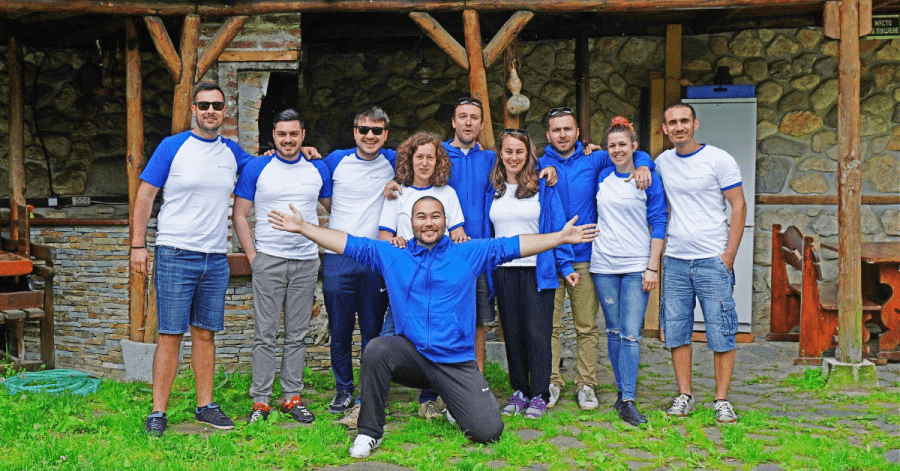The past week marked the beginning of the school year for students in Greece and Romania, and today Bulgarian schools open doors to physically welcome students for the upcoming school year. In 2020, the pandemic demonstrated the importance of having a digitally-enabled education system and changed the way in which we perceive teaching should be happening in the classroom.
Not so long ago, on average only 40% of teachers across the EU were ready to use digital technologies in their classrooms – data that has significantly changed in the past year. To celebrate the contribution of local startups in equipping schools with the necessary digital technologies, we will explore in-depth the story of the Bulgarian Shkolo, an end-to-end administrative and management software platform for schools. The Recursive talked with Simeon Predov, CCO and Business Development at Shkolo, to find out how the startup is transforming education in Bulgaria, how it managed to keep up with the rise in demand last year, and what are the plans of the startup for the new school year.
How did Shkolo.bg get schools into the cloud?
Founded in 2016, by Lyubomir Vanyov (CTO), Miroslav Dzhokanov (CEO), Simeon Predov (CCO), and Alexander Stoyanov (Chief Mobile Division), Shkolo has become the leading platform for digitalization of education in Bulgaria. With the e-diary that the team develops, Bulgaria becomes one of the four countries in the EU which use digital grade books and one of the few countries worldwide, together with the UK, Estonia, and the US, which use software systems for school management.
The main three problems that the edtech startup aims to solve are to minimize bureaucracy, to make parents more engaged in the school life of their children, as well as to motivate students to be more engaged in the classroom. The solution of Shkolo increases the efficiency of schools by optimizing their back-end and administrative processes with features such as automatic reporting, notifications, sending automatic reminders to students and parents, enabling online payments, and paperless tracking of school assets.
“There was a lot of administrative paperwork and bureaucracy that teachers and principals had to handle. That was overwhelming and there had to be a way to improve this process. Additionally, we saw there was a lack of proper communication between students, parents, and teachers or the overall ecosystem within one school,” Predov explains. Parents, for instance, are allowed to easily access the achievements of their children and set appointments with teachers. To make students more engaged in the learning process, the platform also has gamifying features and lets students rate their teachers and assignments.
The journey of Shkolo
Funny enough, “Shkolo” is an old Bulgarian word for school, so who would guess that it will be used in the 21st century as a name for a startup that digitizes education. Predov shares that in 2015 he joined Lyubomir Vanyov and Miroslav Dzhokanov who already had an idea to develop software for inventory management of schools.
“We realized that the idea wouldn’t work as it was a very niche product, so we decided to move forward and work on an e-diary. Then in 2016, when the new law for primary and secondary education enabling the usage of electronic diaries and digitalization came, it was the perfect timing for us to proceed with developing a school management software,” remembers Predov.
The team soon found their first couple of clients which validated the market fit for their solution and encouraged them to focus on developing the platform. As of now, they are serving around 1800 schools, making them the market leader in Bulgaria with 85% of the total market share. There are around 1.2M users of the platform and in 2020, Shkolo was the most searched keyword in Google Search. Right now, the team of Shkolo consists of 52 people but last year, there were around 20-25 people.
Predov says that when the national lockdown was announced, the software team did not sleep for three days in order to move the platform to a whole new infrastructure that would be able to manage the rise in usage. “Тhe demand more than quadrupled. On Monday, March 13th, which was the first school day after the lockdown, the platform still didn’t work. Top executives from the Ministry of Education called us to ask whether we would be able to fix it for a day. And at that point, we realized the extent to which school, parents, and teachers were depending on us for proper communication. So, we are happy to brag not only about the cool software but also about our devoted team,” Predov highlights.
The challenges and opportunities of digital education
According to Predov, a major challenge for Shkolo is to keep providing a great service to their customers by adapting the platform so that it meets the frequently changed regulations from the Ministry of Education. “Another challenge is related to a new project that we started, the Shkolo Academy. We are basically creating a professional place where teachers can learn various soft and digital skills,” the CCO of Shkolo announced. Therefore, their immediate focus in regards to this project will be to build themselves a reputable name on the training and education market for this particular service.
“I don’t think that digitalization is the ultimate solution for all the problems in education, but it definitely creates a sense of ease between the work of different stakeholders. It is a big relief for students, teachers, and parents to have technologies such as virtual classrooms, online tests, tools, and recorded videos. Now that the channels of communication between the stakeholders are settled, hopefully, there will be more innovation to improve the knowledge and the skills of the children,” Predov concludes.







